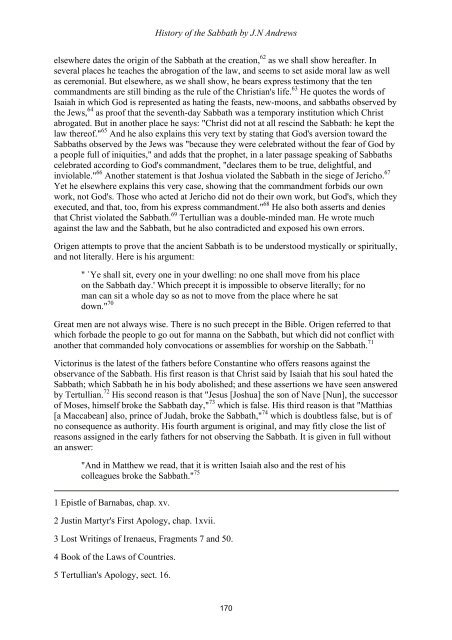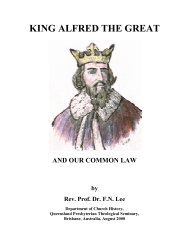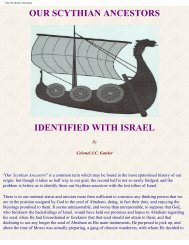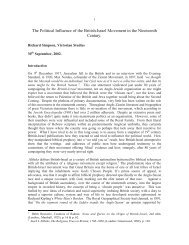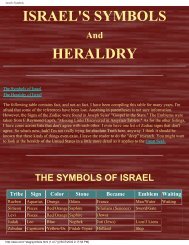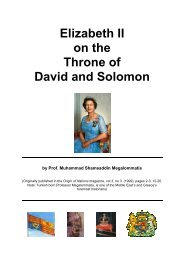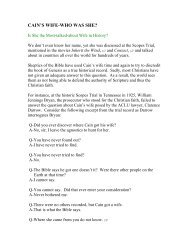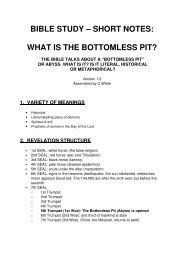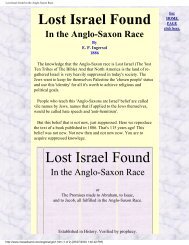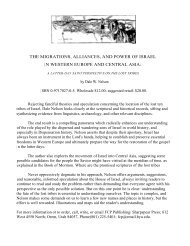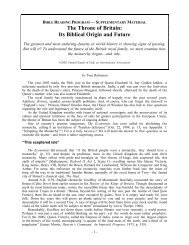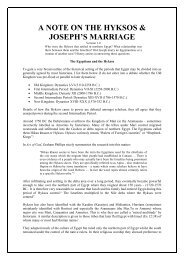HISTORY OF THE SABBATH - Friends of the Sabbath Australia
HISTORY OF THE SABBATH - Friends of the Sabbath Australia
HISTORY OF THE SABBATH - Friends of the Sabbath Australia
You also want an ePaper? Increase the reach of your titles
YUMPU automatically turns print PDFs into web optimized ePapers that Google loves.
History <strong>of</strong> <strong>the</strong> <strong>Sabbath</strong> by J.N Andrewselsewhere dates <strong>the</strong> origin <strong>of</strong> <strong>the</strong> <strong>Sabbath</strong> at <strong>the</strong> creation, 62 as we shall show hereafter. Inseveral places he teaches <strong>the</strong> abrogation <strong>of</strong> <strong>the</strong> law, and seems to set aside moral law as wellas ceremonial. But elsewhere, as we shall show, he bears express testimony that <strong>the</strong> tencommandments are still binding as <strong>the</strong> rule <strong>of</strong> <strong>the</strong> Christian's life. 63 He quotes <strong>the</strong> words <strong>of</strong>Isaiah in which God is represented as hating <strong>the</strong> feasts, new-moons, and sabbaths observed by<strong>the</strong> Jews, 64 as pro<strong>of</strong> that <strong>the</strong> seventh-day <strong>Sabbath</strong> was a temporary institution which Christabrogated. But in ano<strong>the</strong>r place he says: "Christ did not at all rescind <strong>the</strong> <strong>Sabbath</strong>: he kept <strong>the</strong>law <strong>the</strong>re<strong>of</strong>." 65 And he also explains this very text by stating that God's aversion toward <strong>the</strong><strong>Sabbath</strong>s observed by <strong>the</strong> Jews was "because <strong>the</strong>y were celebrated without <strong>the</strong> fear <strong>of</strong> God bya people full <strong>of</strong> iniquities," and adds that <strong>the</strong> prophet, in a later passage speaking <strong>of</strong> <strong>Sabbath</strong>scelebrated according to God's commandment, "declares <strong>the</strong>m to be true, delightful, andinviolable." 66 Ano<strong>the</strong>r statement is that Joshua violated <strong>the</strong> <strong>Sabbath</strong> in <strong>the</strong> siege <strong>of</strong> Jericho. 67Yet he elsewhere explains this very case, showing that <strong>the</strong> commandment forbids our ownwork, not God's. Those who acted at Jericho did not do <strong>the</strong>ir own work, but God's, which <strong>the</strong>yexecuted, and that, too, from his express commandment." 68 He also both asserts and deniesthat Christ violated <strong>the</strong> <strong>Sabbath</strong>. 69 Tertullian was a double-minded man. He wrote muchagainst <strong>the</strong> law and <strong>the</strong> <strong>Sabbath</strong>, but he also contradicted and exposed his own errors.Origen attempts to prove that <strong>the</strong> ancient <strong>Sabbath</strong> is to be understood mystically or spiritually,and not literally. Here is his argument:" `Ye shall sit, every one in your dwelling: no one shall move from his placeon <strong>the</strong> <strong>Sabbath</strong> day.' Which precept it is impossible to observe literally; for noman can sit a whole day so as not to move from <strong>the</strong> place where he satdown." 70Great men are not always wise. There is no such precept in <strong>the</strong> Bible. Origen referred to thatwhich forbade <strong>the</strong> people to go out for manna on <strong>the</strong> <strong>Sabbath</strong>, but which did not conflict withano<strong>the</strong>r that commanded holy convocations or assemblies for worship on <strong>the</strong> <strong>Sabbath</strong>. 71Victorinus is <strong>the</strong> latest <strong>of</strong> <strong>the</strong> fa<strong>the</strong>rs before Constantine who <strong>of</strong>fers reasons against <strong>the</strong>observance <strong>of</strong> <strong>the</strong> <strong>Sabbath</strong>. His first reason is that Christ said by Isaiah that his soul hated <strong>the</strong><strong>Sabbath</strong>; which <strong>Sabbath</strong> he in his body abolished; and <strong>the</strong>se assertions we have seen answeredby Tertullian. 72 His second reason is that "Jesus [Joshua] <strong>the</strong> son <strong>of</strong> Nave [Nun], <strong>the</strong> successor<strong>of</strong> Moses, himself broke <strong>the</strong> <strong>Sabbath</strong> day," 73 which is false. His third reason is that "Matthias[a Maccabean] also, prince <strong>of</strong> Judah, broke <strong>the</strong> <strong>Sabbath</strong>," 74 which is doubtless false, but is <strong>of</strong>no consequence as authority. His fourth argument is original, and may fitly close <strong>the</strong> list <strong>of</strong>reasons assigned in <strong>the</strong> early fa<strong>the</strong>rs for not observing <strong>the</strong> <strong>Sabbath</strong>. It is given in full withoutan answer:"And in Mat<strong>the</strong>w we read, that it is written Isaiah also and <strong>the</strong> rest <strong>of</strong> hiscolleagues broke <strong>the</strong> <strong>Sabbath</strong>." 751 Epistle <strong>of</strong> Barnabas, chap. xv.2 Justin Martyr's First Apology, chap. 1xvii.3 Lost Writings <strong>of</strong> Irenaeus, Fragments 7 and 50.4 Book <strong>of</strong> <strong>the</strong> Laws <strong>of</strong> Countries.5 Tertullian's Apology, sect. 16.170


